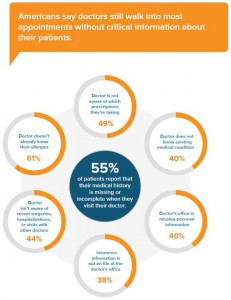When most patients in the U.S. visit their doctors, they find their medical history missing or incomplete. 1 in 2 American patients say their doctors do not have a complete list of their medications.
But the new health consumer expects a connected health experience the likes of which, as consumers, they expect and generally find in their everyday lives.
One-half of consumers would prefer to get lab test results, access their medical records, and fill out paperwork from a doctor’s office ahead of a visit online versus via phone or in person.
Surescripts conducted a survey with Kelton Global in May 2015 among 1,000 U.S. adults, publishing the results this week, with a press release titled, “Patients Prefer Digitally Savvy Doctors and Demand a Connected Healthcare Experience.”
The customer service experience is telling: more Americans would rather call customer service for their bank, cell phone provider, or credit card company than their health plan, Surescripts discovered.
Even as most physicians have adopted some form of electronic health record in their practice, over one-half of consumers said they continue to sign their names on paper forms, and have their insurance card scanned. One-third wrote their personal information on paper forms, the poll found.
But using digital tech in the office gives consumers a perception of the provider that they are organized (70% of consumers say), efficient (70%), innovative (40%), and competent (33%).
When consumers sees technology that allows them to schedule appointments online, 68% of patients say they feel relieved, 65% are “confident” in their physician, and have comfort (55%).
Health Populi’s Hot Points: The connected health/digital experience plays into consumers evolution as homo informaticus, a transformational trend which I explained here in Health Populi.
ZocDoc wrote their take on this phenomenon in August 2015 in their whitepaper, Healthcare Dropouts: The Quiet Crisis. Their research has found that Millennials, women and parents have begun to withdraw from traditional healthcare providers at higher rates than other population segments. “Healthcare just isn’t quick or convenient enough for patients to bother,” ZocDoc asserts, finding that 31% of people say it’s hard to get a last-minute appointment, 27% of people can’t get out of work to make the appointment, and 22% would go to an urgent care clinic — or an ER — instead.
“Healthcare needs to catch up with consumer-first, digital experiences,” ZocDoc concludes.
This sentiment underlies the Surescripts findings.





 Thank you FeedSpot for
Thank you FeedSpot for